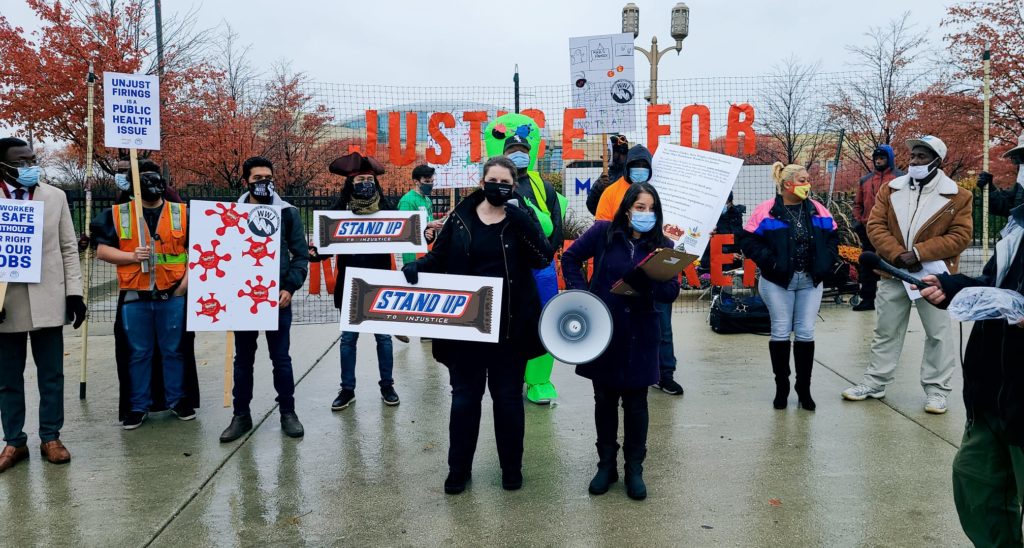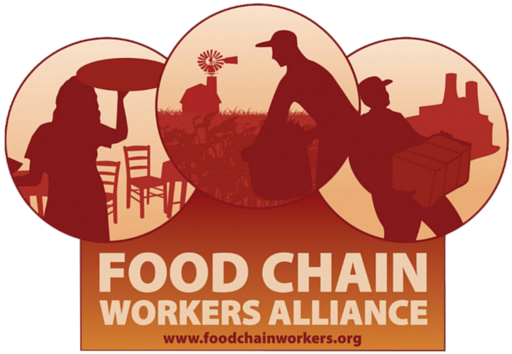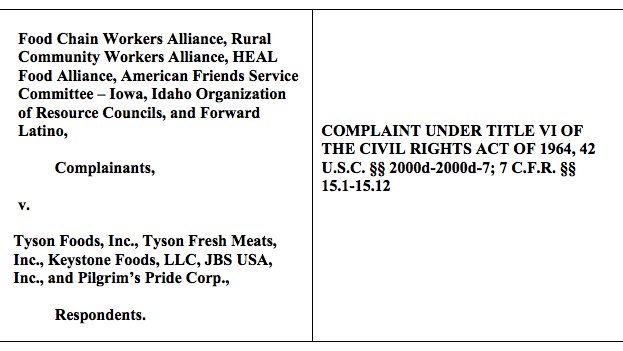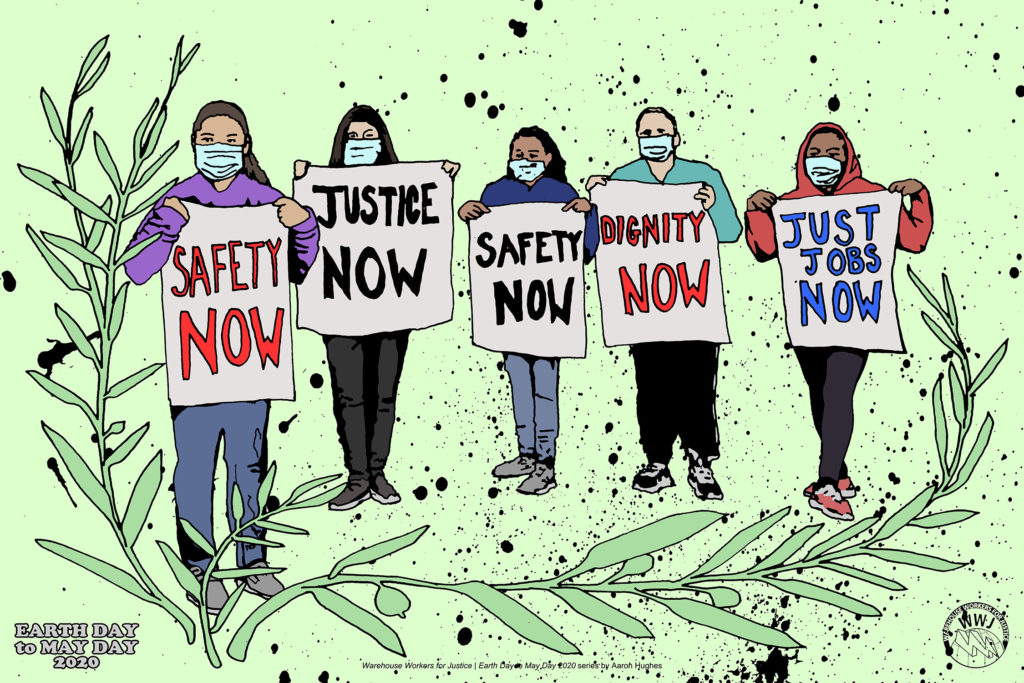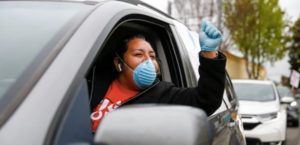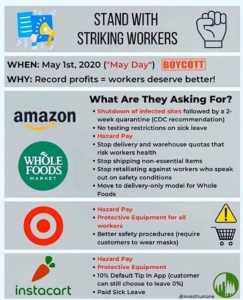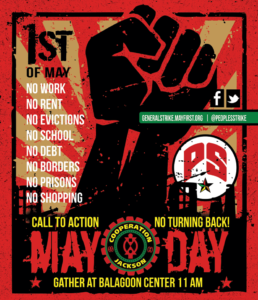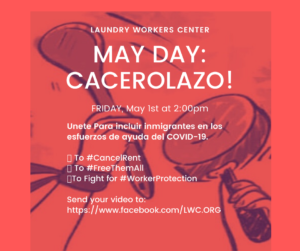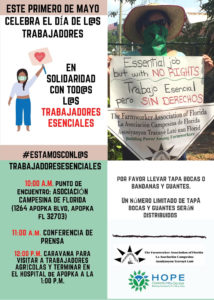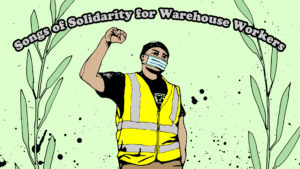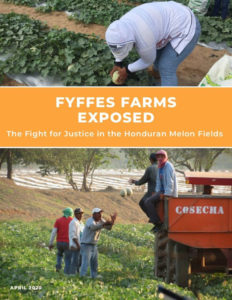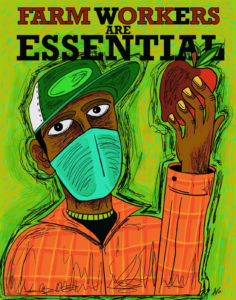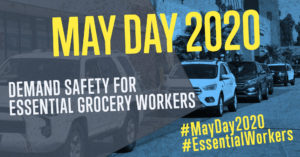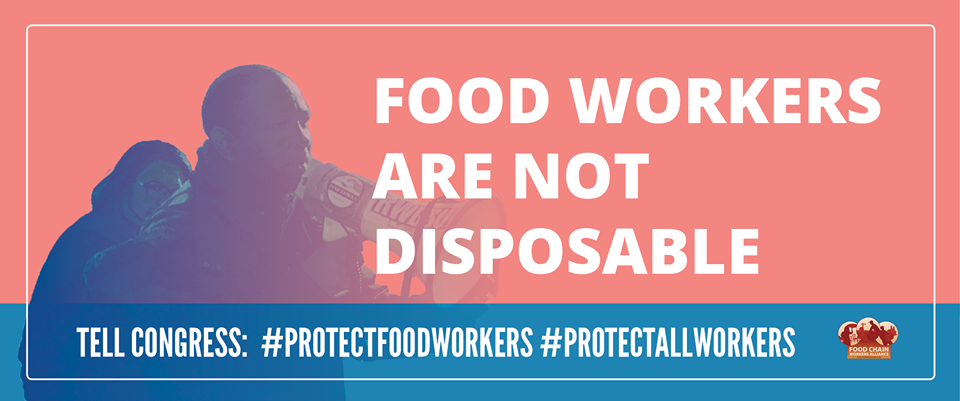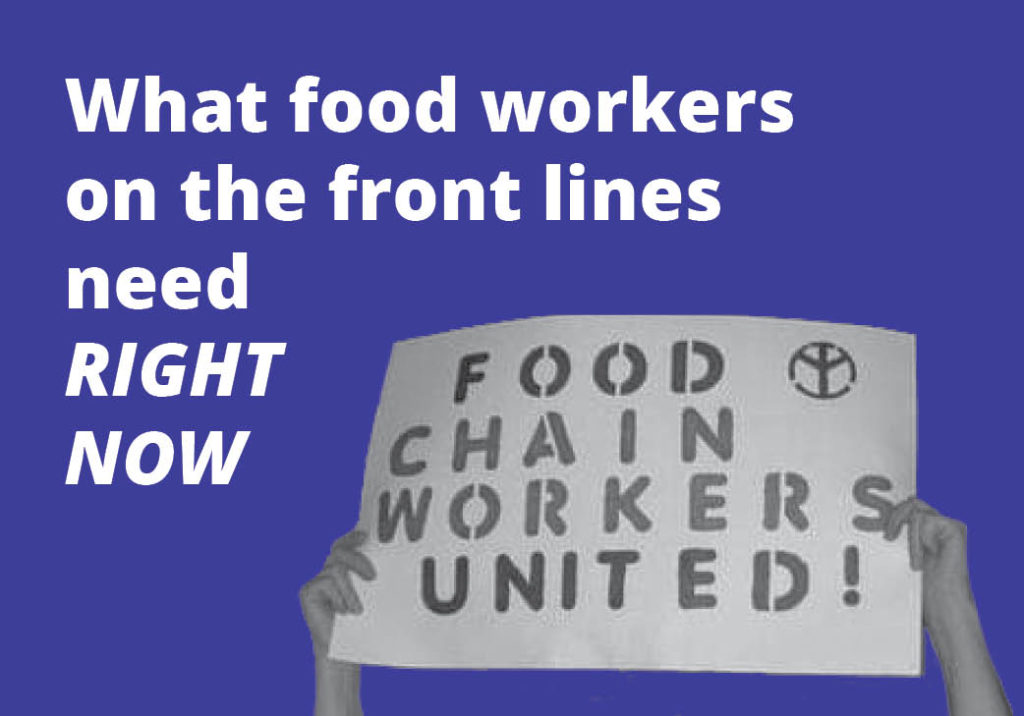Food workers who serve, deliver, distribute, process and harvest our food are doing critical work in this moment of crisis and everyday. Food workers are still on the job throughout the food chain. Every aspect of the food supply chain are essential services for the public and recognized as such in many government orders. This is highlighting what food workers have been saying for years — our work makes it possible for the world to eat.
Yet, food workers on the front line are facing dangerous working conditions, a loss of wages, and a lack of access to healthcare, while many corporations are profiting off this crisis. Urgent action is needed by all levels of government to protect food workers and not just big business, now and in the long-term.
HEALTH & SAFETY OF WORKERS MUST BE A PRIORITY
Even with the enormous job loss taking place, food workers around the country are still working shoulder to shoulder on food processing lines and in warehouses, farmworkers are still planting and harvesting food, food workers are delivering food. Many food workers in rural and urban areas are going to work with no instructions on how to keep themselves safe and without adequate protective gear.
- Employers must provide workers with accurate and current information on how to protect themselves and their communities from the virus in a language they understand, that is culturally appropriate, and at a literacy level that is appropriate.
- Employers must guarantee safe workplaces, including providing all necessary protective equipment, frequent and regular hand-washing breaks, and the required space for “social distancing.” Farmworkers must be provided easy access to clean and a sufficient amount of water at close proximity to the work site.
- The same health & safety information and protective equipment must be given to workers in crowded and substandard employer-provided housing.
- OSHA must issue an emergency standard for infectious diseases to ensure that workers will be protected from all infectious diseases in their workplaces, including COVID-19.
FAIR WORKING CONDITIONS
We also recognize that this is a time of great disruption to the lives of working people. Workers should not have to choose between keeping their jobs and taking care of themselves and their families.
- All workers must have access to free testing, healthcare coverage, and paid sick days regardless of status and size of workplace, including workers in the US and Canada country on H-2A or migrant worker visas.
- A minimum of 15 paid sick days per year leave for all workers regardless of size of workplace, and additional paid leave for all workers.
- Additional paid sick days for all workers when there is a public health emergency.
- H-2A workers that are currently working in the US (and migrant workers working under the Temporary Foreign Worker Program in Canada) and who become ill must be assured not only free health care, but with no penalties for inability to complete a contract due to the illness. They must be provided all important information about safety and security relative to their safe transportation back to their home country. Guestworkers awaiting arrival in the U.S. and Canada to begin work, must be provided all relevant information regarding health and safety protections and measures.
- Workers should be afforded Paid Family Leave as needed
- Workers in industries like retail, warehousing and distribution, delivery, that are expanding their hours and work during this time should make overtime voluntary, and guarantee overtime pay.
- All food workers continuing to provide essential services should be entitled to receive hazard pay, at a premium of time and a half.
SUPPORT WORKERS FACING JOB LOSS & WAGE LOSS
For millions of workers, including food workers, there is enormous job and wage loss. With the majority of food workers already living paycheck to paycheck with low wages, this presents an immediate and long-term crisis. Restaurant workers, reliant on tips to survive, are now facing the financial repercussions of business closings or operating only on take-out.
At the same time, workers need the ability to stop working due to safety concerns, the need to care for family members, or their own health, and still get paid regardless of their immigration status or job classification, now and for the many months this crisis may last. Federal, state and local governments must ensure that workers receive the supplemental income they need in the form of:
- Expanded access to unemployment insurance regardless of immigration or employment status through a clear and easy process.
- Cash grants and other subsidies must be offered to workers facing wage loss, with clear and easy access, covering full replacement of wages, and regardless of employment or immigration status.
- We also support the call to offer monthly cash payments to all U.S. Households to support workers and their families during this crisis.
- We also support the call for cash grants and other financial assistance to support small businesses from street vendors, to bodegas, to local eateries.
- Immediate Moratorium on rent, mortgage payments, loan payments, and no utility shut offs. NO MORE DEBT
- Immediate Moratorium on the Public Charge Rule which would disqualify immigrants who use public assistance from obtaining permanent residency status.
*All corporations in the food economy who will continue to profit in the millions, billions and trillions should continue to pay their workers during this time of wage loss. The government should make it a condition of any bail-outs to businesses that the company continues to pay workers throughout the crisis.
IMMIGRATION & UNDOCUMENTED WORKERS
First and foremost, ALL OF THESE BENEFITS MUST BE MADE AVAILABLE TO ALL WORKERS REGARDLESS OF STATUS! We also call for:
- An Immediate moratorium on all immigration enforcement, including repatriations and deportations of guest workers and non-status migrants
- An Immediate release of all immigration detainees from detention centers and detention camps and adequate health services for all.
- A removal of restrictions on work permits for guest workers and migrant workers who have been laid off or terminated
STREET VENDORS
Street vendors are generally not eligible for state-sponsored benefits or support like paid sick leave and unemployment insurance, or even small business relief funds. For workers in informal economies, this is a dire situation, leaving many with fear and confusion as to how they will support themselves and their families in the days, weeks and months to come. These low-wage immigrant workers rely on busy streets in order to survive day to day. Without a safety net to fall back on, they are forced to continue to work, with little returns, and risking their health and wellbeing in the process. We join Street Vendors in New York City and elsewhere calling for:
- Waiving all late penalties for late tax filings
- Immediate suspension of city and state enforcement of street vendor compliance violations – regardless of whether the vendor has a permit or a license.
- Waiver of outstanding tickets issued since January 2020, as vendors won’t be able to work for the foreseeable future.
- Create and expand granting opportunities for low-income sole proprietors for street vendors and other small business
- Ensure street vendors and delivery workers are included in city child care plan for frontline workers
- Ensure workers who are employed by food cart or truck owners, including undocumented workers, are eligible for unemployment insurance and any forthcoming emergency relief funds
RIGHT TO ORGANIZE
This moment is illuminating what is always true, that the food industry is one of the most exploitative industries in the world and food workers are too often treated as disposable.
We must demand:
- An expansion of protection of the right to organize, enabling food workers to meaningfully exercise their labor rights, to protect themselves and their communities.
